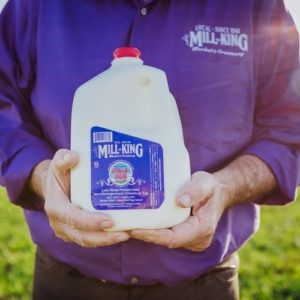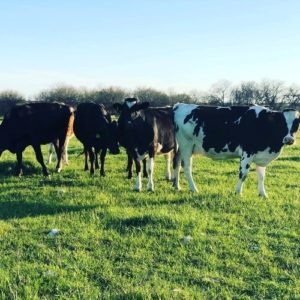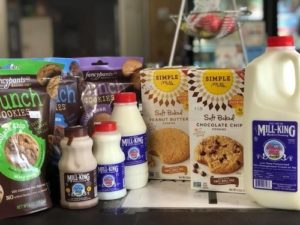Towny Waco: Meet the Legen-dairy Mill-King Dynasty
(Welcome to the Act Locally Waco/Towny blog series. Towny is an app that connects consumers with local businesses for coupons and other great deals. Through this blog series, the folks at Towny will be sharing the stories behind some of our high-quality, local products and helping you get to know some of our energetic local entrepreneurs. For more posts in this blog series, click here: Towny Waco.– ALW)
By Tori Freeman
The history of Mill-King Market & Creamery traces back to 1941, when Arnold and Minnie Miller began raising dairy cattle on their homestead and selling their excess milk at stores in Crawford. Eventually, they began selling to a milk co-op that picked up their milk and delivered it to a milk processor.

Their son Billy began dairying with his parents, and in 2005, Billy’s own son Craig, joined the family business after finishing college. Craig and his wife Rhianna transitioned Mill-King from selling to a co-op to producing and processing their own milk for retail. Rhianna shared with us the what, why, and how of this local farm.
How did you make that transition?
“The economy for the dairy industry got really bad in that period. Craig and I actually struck out on our own with a genetics business dealing with cattle. We worked with beef cattle, beef yards, large dairies, small dairies, and one-cow whole milking families. So, we learned a lot about what all else was out there.
As the economy worsened, we decided that in order to keep going we needed to do something. We couldn’t keep selling our milk to the co-op because at the time dairy farmers were being paid several dollars under the cost of production. So, in December 2010, we got a retail license so we could sell raw milk straight off the farm.
We started doing that, and then we learned about low-temp pasteurization. Throughout 2011 and then into 2012 we built a plant here on the farm ourselves and then slowly started getting our milk out into farmer’s markets, grocery stores, restaurants, ice cream shops, cheese distributors, and other spots.
We process everything that comes off of our own farm, and we basically have a closed herd — that means that we raise our own cattle. So, we have our hand on the process of the milk straight from the birth of the calf all the way to getting the milk to the distributor. At one point, we even got it to the grocery stores and restaurants ourselves, but in order to grow we’ve had to utilize distributors the last four years.”
What makes Mill King different?
“Our milk is different than conventional grocery store milk or even conventional organic milk because ours is low-temp pasteurized and non-homogenized. We pasteurize it at a lower temperature for a longer time, which keeps in the good bacteria and enzymes but it kills anything that could be harmful.

The non-homogenized part—homogenization is basically the process of taking the fat molecules in the milk and shattering the molecular structure so it stays suspended in the milk and it doesn’t separate–we don’t do that. That means our milk has the cream in it and it will rise to the top, so you have to shake it back in.
But that also has some health benefits, as research has shown. A lot of times your body doesn’t know when you’ve manipulated a molecular structure of a food item. It doesn’t then know how to process it, so it doesn’t process it correctly.
Also we don’t add in any additives, no preservatives. We don’t add any defoaming agents in our processing anything like that.
A lot of conventional grocery store milk has different things added into it but, because of our laws, if it’s less than one percent you don’t have to label it. Eventually, if you have one percent of this and one percent of that, how much milk do you actually have left in there? So that’s another factor that makes our milk different.
And then, we are really strict on how our cows are fed. We practice all organic methods even though we’re not certified, because we feel like it’s important that we don’t take any exemptions. A lot of times, organic dairy farms can take exemptions. So, for example, if they can’t find non-GMO cottonseed, then they’ll get an exemption where they can feed up to 25 percent of a product that doesn’t conform to the organic standards.
We feel like it’s extremely important to stay true and as natural as possible, so we feed non-GMO, and our cows are grass-fed as much as possible – no grain, no corn, no soy, no cottonseed, or anything like that. We make sure that it’s local or if we bring it in, we make sure that it is certified non-GMO. We’re really particular on that.
The way our cows are treated, and then the way we treat the milk in the processing plant makes it different from others. On top of that, it’s local. So, all the milk that is going out is from right here in McLennan County.”
You sound very passionate about it now, but was this something you had envisioned for yourself growing up?
“Haha, no. In fact, I have two business degrees. I get to use them, but this is not at all what I thought I would be doing. Even for Craig, this is not necessarily what he thought he would be doing. But when we found this, we found that there was such a need.

We literally started out selling milk out of ice chests out of the back of our car. Then in 2012 we started doing the farmer’s markets in Austin. Our little girl at the time was only six months old. We would spend all day Friday getting ready, and then oh my gosh so early in the morning, ridiculously early in the morning, haul her and everything down there to Austin. Craig and his mom and I would each do a farmer’s market while his dad stayed here at the farm and took care of the cows.
We were able to meet different chefs in the area and get connected with some farm-to-table providers and just slowly grew the business by demand.
It’s not something that’s easy to do. It’s very, very difficult because we literally have our hand on every part of the process. You have to know a lot of things: You have to know about the dairy. You have to know about milk processing. You have to know about logistics and transportation and sales.
And, on the backside of it, you’ve got to be able to your make your money work. We’re connected to agriculture, and dairy specifically, so most banks with that sort of stuff, like, ran away screaming when we brought this idea to them because they thought this is never gonna work.
We had lots of trouble in the beginning. We really thought we’d be able to put a sign out in the yard, sell a ton of raw milk, and sell a ton of raw milk cheese. We even went to New York to learn how to make cheese. We tried all these other things in the beginning, but then we just had to follow where the market led us. So no, no one envisioned what we’re doing right now is what we’d be doing.”
Check out the Mill-King Market & Creamery for a selection of clean, allergy-free, and locally-sourced produce + products + (of course) milk! Isn’t it fun to support locals who support other locals? Find even more local shops (AND earn rewards for your visits) on Towny, the free online and mobile app to exploring Waco!

Tori Freeman is a Colorado native turned Texan and a graduate of Baylor University. She works as a part-time paralegal and creative freelancer with expertise spanning writing, editing, and photography. Tori knows firsthand how local businesses can change lives—she met her husband, Braden, while working at the Hippodrome! They now happily live in Waco with their spoiled golden-doodle and their even more spoiled baby boy.
The Act Locally Waco blog publishes posts with a connection to these aspirations for Waco. If you are interested in writing for the Act Locally Waco Blog, please email [email protected] for more information.
